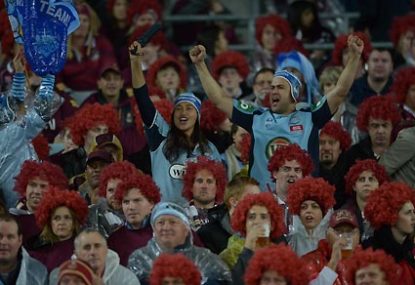'Was never on': Lomax sells Ben Hunt down the river, gifts Roosters try with needless offload
This just about summed up the first half for the Dragons as they trailed 30-6 at the break.

While it didn’t have the “I can’t believe they just did that” moment of Origin I, there was plenty of action on Wednesday night that could have sent fans, commentators and players alike scrambling for the rule book.
A couple of key moments are addressed below with reference to the official rules and referee guidelines.
Sin-bin? Penalty Try? Neither? Both?
Early in the second half, Mitchell Pearce put through a grubber, Todd Carney chased and was clearly pulled back by Cooper Cronk as Billy Slater came across to cover. The ball was knocked dead in-goal and Tony Archer called on the video referee to rule on the decision. This play generated a number of questions:
Why was the video ref involved? No-one in Australia thought Carney had grounded the ball so there was no obvious reason for Archer to call the video referee unless it was to ask “is it a penalty try?” This wasn’t the case.
Was it a penalty-try? The official rule book states “the Referee may award a penalty try if, in his opinion, a try would have been scored but for the unfair play of the defending team” and the video refereeing guidelines state “the benefit of the doubt rule will apply to the attacking team”. These combined indicate that unless the video referee was reasonably confident that Carney would not score it should have been a penalty try. This is obviously a subjective matter but it would seem that the benefit of the doubt should have gone to the attacking team.
Was it a sin-bin offence? The referee guidelines for sin-binning state that a player can be sin-binned for “deliberate break down of play, especially in try scoring positions”. This clearly applied and so, especially given that a penalty try was not awarded, the referee had little choice but to put Cronk in the sin-bin.
Could it have been both? Though it is not officially stated, the unofficial policy is that the penalty try would have been sufficient punishment and so if it had been awarded, Cronk would not have been sin-binned. Ironically, given the tries NSW went on to score in his absence, this may have been a better result for Queensland.
Did Hayne knock the ball on?
Approximately five minutes later, Jarryd Hayne was tackled by Jonathan Thurstan, after which the ball spilt onto Hayne’s boot, was picked up by Josh Morris who then scored. On the video replay it appears that Thurston made a play at the ball.
Given that benefit of the doubt favours the attacking team and the rule states that it doesn’t matter which direction the ball goes if the ball is dislodged as a result of the defender playing at the ball, it was not a knock on and it was a try.
Drop out or 20m tap?
With about nine minutes to go, Brett Tate had the ball in the in-goal and would have scored had Michael Jennings not punched the ball from his hands and over the dead ball line. A 20m tap was awarded.
This was clearly the wrong call. As Jennings played at the ball and dislodged it from Tate’s hands, he is considered the last to have touched the ball and it should have been a drop-out.
When is a charge down not a charge down?
In the dying stages, as Queensland scrambled for the match-winning try, on the fifth tackle Cooper Cronk kicked forward, the ball struck the arm of Akuila Uate and fell to the ground. He then picked it up and ran away to score. The consensus of the players, commentators and eventually the video referee was that Uate had attempted to catch the ball and as a result his knocking of the ball to the ground constituted a knock-on. Play restarted with a scrum.
This however, was inconsistent with the letter of the law: “Charging down is blocking the path of the ball with hands, arm or body as it rises from an opponent’s kick … To charge-down a kick is permissible and is not a knock-on” Nowhere does it say that the defender must not be trying to catch the ball, only that it needs to be rising. As this was the case in this instance, it should not have been a knock-on and a try should have been awarded.
Conclusion
The most obviously wrong call of the night (the Tate / Jennings in-goal incident) obviously favoured NSW and could well have been decisive. It could also be argued that the sin-binning of Cronk, rather than the awarding of a penalty try ended up benefiting NSW as well, however this is not to say that the decision favoured NSW per se.
On the whole, the conspiracy theorists who bob up every year claiming that the NRL has rigged it to ensure a Game 3 had little to argue about and for this we should all be grateful!